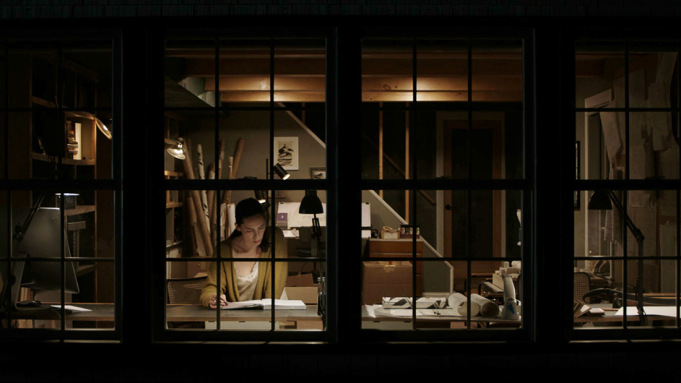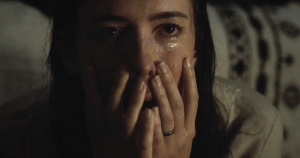
Truly great films have the best of both worlds. On one end, they’re well crafted visual delights that entertain and engage an audience. At the other end, they are carried by strong themes that philosophize and explore the deeper mysteries of the world. Most of the time these two entities share a common space. They live with each other as a whole and if you tear one away, the other can still stand on its own. The Night House is a rare case where at the end of the day these two forces exist and get their points across, but somehow they are conflict with each other.
Recently widowed Beth is left to mourn the loss of her husband Owen in the lake house he both built, and killed himself at. They had a loving, seemingly perfect marriage. With nothing more than a cryptic note left behind, Beth mind races as she tries to understand why Owen, with no signs, would all of a sudden commit suicide. As these thoughts flood her mind, she beings to witness strange things happening in and around her house at night. Are these just dreams of an overly stressed mourner? Or is something more sinister going behind the nocturnal happenings at this secluded location? As Beth searches for answers, the truth of what Owen did when Beth wasn’t around start to come to light.

The Night House is in many ways, two movies. It is a haunted house film for those that want to be feel the hairs on the back of the neck stand on end.
It also is a very clear and well presented allegory about depression. But these ideas are somewhat exclusive from each other. By the end of the film, the thematic power of the film’s message is somewhat wiped out by the less ambiguous nature of the supernatural elements of the plot.
Now, I’m not going to give anything away. But while the final note of the film is left to make you think that maybe everything that happened within the film was still just in Beth’s head, the overarching implications of what Beth discovered about Owen reverse that notion.
Clever visual mapping and sound design drench The Night House in wonderful glory. It’s a film based on a premise of perception that plays with its own perception in masterful ways. On the haunted house side of the equation, The Night House might be the best of its kind in a long time. All of the inexplicable and sometimes ridiculous nature of even the scariest films in the world are outdone by the class and sophistication of this film. It’s not looking to throw cacophony of jump scares at you (though there are one or two), but the creepy factor is turned up to 11 and its just fantastic. And let’s also not forget that the ever amazing Rebecca Hall is on the top of her game here, as well.

As the title card blasts onto the screen, Richard and Linda Thompson’s “Calvary Cross” comes blaring along with it. Now, it’s time to get a little personal, as Richard Thompson is my favorite musician of time. He’s not the most well known artist in the mainstream, so when his songs appear in a film, I get excited. “Calvary Cross,” ends up being its own character in the film. It becomes an audio cue multiple times in the film, alerting Beth that she is in for a “visit.” What I find most interesting though, is while the song plays long enough to reach its chorus, you never hear that section. I’d call the chorus to “Calvary Cross” a sort of coda for the films message. Or maybe even a hint as to Owen’s motives if you didn’t figure it out before hand.
This is where the unbalanced nature of the theme vs. events becomes an issue. You are left with two possible beliefs at the end of the film. If you go with the one that would claim everything was just in Beth’s head, it does create a darker and more depressing idea based on the truths that we do know about Owen.
But that secret message that comes along with the chorus of “Calvary Cross” hints that the supernatural aspect of the story was in fact real. Which means that the terrific sideview look at depression the film offers, doesn’t have the same impact and looses some of it fervor. If anything, this battle of story versus theme makes The Night House becomes the perfect example of, “You can’t have your cake and eat it, too.”
Final Grade- B

